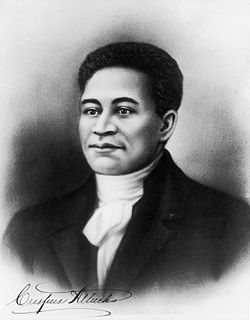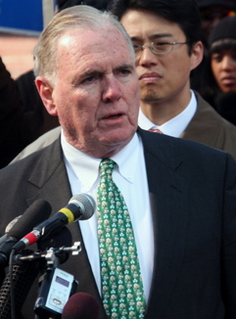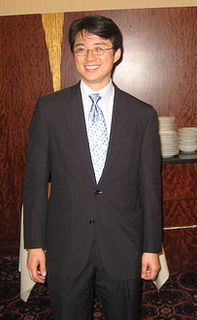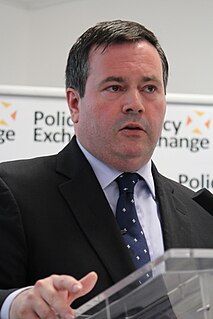Campaign
On March 5, 1983, former State Representative Mel King became the first candidate to officially enter the race. The focus of his campaign was decentralizing the city's government and bringing together its racially polarized population. His announcement came on the 213th anniversary of the death of Crispus Attucks during the Boston Massacre. [5]

Crispus Attucks was an American stevedore of African and Native American descent, widely regarded as the first person killed in the Boston massacre and thus the first American killed in the American Revolution. Historians disagree on whether he was a free man or an escaped slave, but most agree that he was of Wampanoag and African descent. Two major sources of eyewitness testimony about the Boston Massacre published in 1770 did not refer to him as "black" nor as a "Negro"; it appears that Bostonians viewed him as being of mixed ethnicity. According to a contemporaneous account in the Pennsylvania Gazette, he was a "Mulattoe man, named Crispus Attucks, who was born in Framingham, but lately belonged to New-Providence, and was here in order to go for North Carolina."

The Boston Massacre, known to the British as the Incident on King Street, was a confrontation on March 5, 1770 in which British soldiers shot and killed several people while being harassed by a mob in Boston. The event was heavily publicized by leading Patriots such as Paul Revere and Samuel Adams. British troops had been stationed in the Province of Massachusetts Bay since 1768 in order to support crown-appointed officials and to enforce unpopular Parliamentary legislation.
On March 15, former Deputy Mayor and Massachusetts Bay Transportation Authority general manager Bob Kiley became the second candidate to enter the race. [6]

The Massachusetts Bay Transportation Authority is the public agency responsible for operating most public transportation services in Greater Boston, Massachusetts. Earlier modes of public transportation in Boston were independently owned and operated; many were first folded into a single agency with the formation of the Metropolitan Transit Authority (MTA) in 1947. The MTA was replaced in 1964 with the present-day MBTA, which was established as an individual department within the Commonwealth of Massachusetts before becoming a division of the Massachusetts Department of Transportation (MassDOT) in 2009.
Robert R. Kiley was an American public transit planner and supervisor, with a reputation of being able to save transit systems experiencing serious problems. From 2001 to 2006 he was the initial Commissioner of Transport for London, the public organisation empowered with running and maintaining London's public transport network.
On March 20, Mayor Kevin White told WCVB-TV's Frank Avruch that he planned on running for an unprecedented fifth term. However, soon after the announcement, aides to the Mayor retracted his statement, saying that it was "facetious" and "jocular". [7]

WCVB-TV, channel 5, is an ABC-affiliated television station located in Boston, Massachusetts, United States. It is owned by Hearst Television, a wholly owned subsidiary of Hearst Communications. WCVB-TV maintains studio and transmitter facilities located separately in Needham, Massachusetts.
On April 19, City Councillor Frederick C. Langone declared his candidacy. Langone was accused of running as a publicity stunt, a charge the Councillor denied. To prove that his campaign was serious he announced that he would not seek another City Council term. [8]
On April 24, Suffolk County Sheriff Dennis J. Kearney declared his candidacy at Faneuil Hall. He promised that if elected he would create an office of internal affairs to investigate "fraud, waste and abuse". [9] He also promised to hire 99 new police officers each year for the next three years, a plan which would cost the city $3 million. [10]
Former School Board President and radio talk show host David Finnegan announced his candidacy on April 21 at the Strand Theatre in Uphams Corner. Finnegan chose to make his announcement in Uphams Corner because White had not fulfilled his promise to rebuild the neighborhood and the man he appointed to run the project was jail. He attempted to portray himself as the best candidate to defeat Mayor White and used the campaign slogan "Finnegan or him again." [11] After White announced that he was not running, Finnegan changed the slogan to "Begin Again with Finnegan". [12]
On April 26, Lawrence DiCara, David Finnegan, Ray Flynn, Dennis Kearney, Bob Kiley, Mel King, Frederick Langone, and Eloise Linger participated in the first mayoral debate. [13]
On April 27, City Councillor Ray Flynn announced his candidacy. As part of his announcement he released "The Flynn Program for Boston", a 30 page booklet outlining his proposals for jobs, housing, crime, services, and other issues. [14]
On May 6, LaRouche movement member Michael Gelber announced that he was entering the race. [15]
On May 26, Mayor White announced that he would not seek a fifth term. [16]
The first televised debate of the campaign was held on June 29. All nine candidates participated. [17]
The League of Women Voters of Boston and the Boston Chamber of Commerce hosted a debate between Kiley, Flynn, Langone, Kearney, Finnegan, and DiCara at Faneuil Hall. Gelber and Linger were excluded from the debate and King chose not to participate in protest of the decision to exclude two of the candidates. [18]
Shortly before the preliminary election, Bob Kiley withdrew from the race and endorsed DiCara. [12]
Two weeks before the preliminary election, a poll by The Boston Globe showed that King was in a dead heat with Finnegan and Flynn. King's campaign gained momentum through a voter registration drive and visits from Chicago Mayor Harold Washington and Atlanta Mayor Andrew Young. [12]
Although he had the most campaign funds and was considered to be a favorite to make the runoff election, Finnegan was criticized for running a "safe" campaign and for "lack[ing] substance". [12]
On October 11, Flynn and King received the most votes in the preliminary election and moved on to the general election. Flynn went on to win the general election, 65%–35%.


























